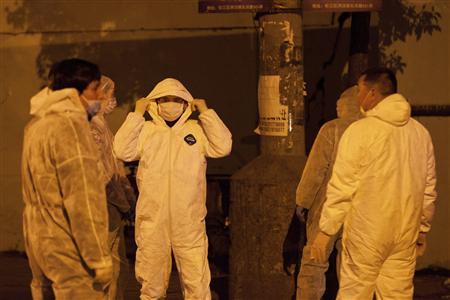– Chinese H7N9 Bird Flu Strain Found In Chickens, Poultry Markets Closed, Culled As Epidemic Concerns Spread (ZeroHedge, April 6, 2013):
When we updated last on the most recent happenings in Shanghai (and now various adjoining provinces) as a result of the spread of the H7N9 bird flu, which has so far taken 6 lives, we warned that it is “starting to have major spillover effects on the broader economy, such as mass slaughter of poultry at local markets – a move which will have certain inflationary effects to an economy already on the cusp of losing the war with the G-7’s hot money.”
Indeed, while the human casualties may be promptly contained, it will be the downstream effects on the economy that will have long-term reverberations. As SCMP reports, following yesterday’s spot checks at various closed Shanghai poultry markets, the H7N9 strain has been found to have infected local chickens. “The ministry said last night that 10 chicken samples from two markets in the Minhang district of Shanghai and at the Huhuai Farm Products Market in the adjacent Songjiang district had tested positive for H7N9. The virus was also found in two pigeon samples and seven environmental samples collected from these markets, out of a total 738 samples tested.”
The result has been widespread culling of chickens both in Shanghai and elsewhere, and while the government has been “generous”, promising to pay vendors “compensation equal to at least 50% of the market price of the poultry slaughtered”, the result is a complete collapse in all chicken-related sales.
From SCMP:
Li Wenqi, a poultry farmer in the city’s Xuhui district, said his business had fallen from 100 chickens a day to zero since the H7N9 outbreak, but he was still very willing to comply with the government.
“Our business is suffering but people are dying,” he said. “We can only be co-operative. This is not the time to bargain with the government.”
As we reported yesterday, poultry markets are now closed indefinitely and chickens across the region are being widely exterminated. Reuters catches up:
State-run Xinhua news agency said authorities planned to cull birds at two live poultry markets in Shanghai and another in Hangzhou after samples of the H7N9 virus were detected in birds at the three sites.
More than 20,000 birds have been culled at another Shanghai market where traces of the virus were found this week.
Officials in Shanghai, China’s financial hub, ordered all live poultry markets in the city closed on Saturday, leaving food stalls empty.
Authorities also banned all poultry trading in Nanjing, another eastern city, although officials said they had not found any trace of the bird flu virus and chicken on the retail market was safe to eat, official media reported.
As a result of the anti-chicken revulsion, consumption will be redirected to that other staple, pork, prices are set to spike once more in a repeat of early 2011, forcing the PBOC to engage rising food prices even more aggressively (now that both Bernanke and Kuroda are flooding the market with boiling hot money) at least for as long as the psychological shock of eating potentially toxic meat dissipates, which may take months and months.
The good news, for now, is that there is no widespread panic. However, as more of the population recalls the SARS panic of 2003, this may change:
The new strain of bird flu has infected 16 people in China, all in the east of the country. Six people have died and the outbreak has spread concern overseas and sparked a sell-off in airline shares in Europe and Hong Kong.
There were no signs of panic in Shanghai, where four of the six deaths have taken place, and people said they were not worried. But the culling, which has been widely publicised, did underline for some how close to home the issue had become.
“Now it’s just downstairs,” said Liu Leting, a user of Weibo, China’s version of Twitter which has more than 500 million users.
“Suddenly I discover that I’m living in an epidemic zone!”
In one city restaurant, a waitress said they planned to stop serving chicken because of the outbreak.
“After we sell out the chicken in stock, we will not buy new chicken and will stop serving chicken dishes for the time being,” said the waitress, who declined to be identified.
Still, the flashbacks have yet to begin:
The 2002-2003 epidemic of Severe Acute Respiratory Syndrome (SARS) started in China and killed about one-tenth of the 8,000 it infected.
Still, there were few signs of panic in Shanghai with shops remaining open and not many people wearing face masks in public.
Yet while the market already responded to the threat of inflation, with the Hang Seng selling off 2.7% on Friday and sending airline stocks broadly lower, it is the human element that will be the key focus:
Secretary for Food and Health Dr Ko Wing-man said: “I think we ought to be prepared, mainly because of the fact that H7N9 up to this moment has created a relatively high mortality rate in infected patients.
“Secondly, the outbreak has been extending or worsening in the last two to three days in eastern China.”




One cannot believe anything Chinese media says. If they say six are dead, it is probably more like 600. During the SARS epidemic, I was working for an international mfg. corporation that had several factories in China. I had several hiring managers who often had to spend time there. At the end of the SARS epidemic, they claimed 600-800 deaths. According to my managers who were there, the real number was in the thousands, entire villages were wiped out. Some of them were quarantined upon return, and their stories to me would make your skin crawl.
The hygiene we are used to doesn’t exist there. The workers live, eat and sleep at the factories, many to a bedroom with minimal plumbing benefits, truly awful.
When you add the fact all major nations have labs that develop germs for biological warfare, the picture is very grim.
China does not value human life as we do in the west, they suffer from overpopulation. They would not shut down these markets for six people, the problem is much larger, they are not telling the truth, as usual.
Thanks for covering this. I saw it on the Guardian, but there was no place to respond to the mythical six dead Chinese.